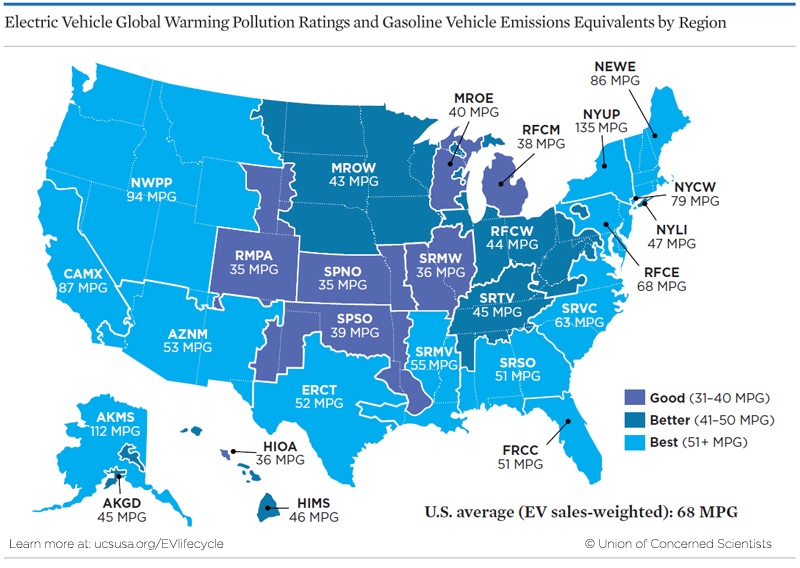A new Union of Concerned Scientists report shows that due to considerable gains made in cleaning the electric grid and in producing electric vehicles more efficiently, EVs are the environmentally sensible choice.

The UCS report, "Cleaner Cars from Cradle to Grave (2015)," considers three variables in its evaluation of lifecycle carbon emissions that includes "vehicle production, operation, and disposal":
- Regional electricity grids across the United States based on the global warming emissions produced from electricity generation,
- Emissions generated by charging an EV,
- Emissions produced by gasoline-powered vehicles.
"Two-thirds of all Americans now live in areas where driving an EV produces fewer climate emissions than almost all comparable gasoline and gasoline hybrid cars—a fact attributable to more efficient EVs and an increasingly clean electricity grid," states the introduction to the report.
The 2012 "State of Charge"report [PDF] is posted here.
To see the fuel efficiency necessary to match that of an EV, find your region on the map below:

Credit: UCS blog: How to Calculate Electric Vehicle Emissions by ZIP Code and Model
The lowest fuel efficiency on the map is in Kansas with 35 mpg. The average fuel efficiency for a new passenger car in the United States is 36 mpg; for a light truck, it's 25.3 mpg, according to the Department of Transportation.
The utilities move away from coal to natural gas and renewables played a critical role in making electric vehicles cleaner. Coal-powered electricity "emits between 1.4 and 3.6 pounds of carbon dioxide equivalent per kilowatt hour (lb. CO2e/kWh)," writes USC policy analyst Josh Goldman, policy analyst. "Natural gas, by comparison, emits between 0.6 and 2 lb. CO2e/kWh."
The report accounts for the fact that "BEV [battery electric vehicle] production results in higher emissions than the making of gasoline cars—mostly due to the materials and fabrication of the BEV lithium-ion battery," writes Rachael Nealer in her UCS blog.
For an interesting read on the new report, please see David Roberts' piece in Vox.
A June CityLab article based on a working paper from the National Bureau of Economic Research presents a contrary viewpoint (posted here). The report also considers criteria pollutants and rebates given to EVs.
Hat tip: Paul Scott, EVs and Energy
FULL STORY: UCS report: Cleaner Cars from Cradle to Grave (2015)

Planetizen Federal Action Tracker
A weekly monitor of how Trump’s orders and actions are impacting planners and planning in America.

Maui's Vacation Rental Debate Turns Ugly
Verbal attacks, misinformation campaigns and fistfights plague a high-stakes debate to convert thousands of vacation rentals into long-term housing.

San Francisco Suspends Traffic Calming Amidst Record Deaths
Citing “a challenging fiscal landscape,” the city will cease the program on the heels of 42 traffic deaths, including 24 pedestrians.

Amtrak Rolls Out New Orleans to Alabama “Mardi Gras” Train
The new service will operate morning and evening departures between Mobile and New Orleans.

The Subversive Car-Free Guide to Trump's Great American Road Trip
Car-free ways to access Chicagoland’s best tourist attractions.

San Antonio and Austin are Fusing Into one Massive Megaregion
The region spanning the two central Texas cities is growing fast, posing challenges for local infrastructure and water supplies.
Urban Design for Planners 1: Software Tools
This six-course series explores essential urban design concepts using open source software and equips planners with the tools they need to participate fully in the urban design process.
Planning for Universal Design
Learn the tools for implementing Universal Design in planning regulations.
Heyer Gruel & Associates PA
JM Goldson LLC
Custer County Colorado
City of Camden Redevelopment Agency
City of Astoria
Transportation Research & Education Center (TREC) at Portland State University
Jefferson Parish Government
Camden Redevelopment Agency
City of Claremont




























